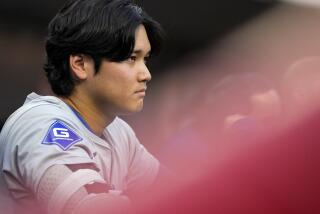Selig Optimistic on Drug Curbs
- Share via
MESA, Ariz. — Baseball Commissioner Bud Selig said Saturday he would “effectively rid our sport of steroids in the coming season,” optimism he said was based on fewer positive performance-enhancing drug test results from last season and the league’s new testing policies and procedures.
Two days after a House Government Reform Committee asked 11 baseball executives, players, former players and union officials to attend a March 17 hearing on steroid use in the game, Selig announced that 1% to 2% of the 1,183 players tested in 2004 for performance-enhancing drugs produced positive samples, down from as high as 7% the year before.
Amid the controversies of the Bay Area Laboratory Co-Operative scandal that implicated Barry Bonds, Jason Giambi and Gary Sheffield, a best-selling book by Jose Canseco that accused several high-profile players, including the retired Mark McGwire, of using steroids, and a revamped testing program that some experts said is not stringent enough, Selig defended his record on steroids and insisted the game is becoming cleaner.
Speaking in the press box at HoHoKam Park, spring-training home of the Chicago Cubs, Selig said he was “startled” by the decrease in positive tests, both in the minor leagues, where 1.7% of the 2004 tests were positive, down from 11% three years before, and the major leagues.
“This is a sport where some people without any knowledge have said it’s rampant,” Selig said. “Well, it isn’t rampant. When you’re down to 1%-2%, most everybody who has heard the numbers said that they’re stunning, and I happen to agree with them.
“I’m very comfortable in telling you I believe we’ve not only dealt with our problem, but we will finish what we started seven years ago this year. There will always be some exceptions, but I’m very comfortable in what we’ve done.”
Union chief Don Fehr said Saturday night he was “pleased” the results suggested the system was working.
Under the former policy, major league players were tested through urinalysis once last year, nearly all of them after the All-Star break in July. The new program provides for one mandatory unannounced test a year, random tests throughout the year, stricter disciplinary measures and a broader list of banned substances.
While human growth hormone is on the list, scientists cannot detect it in urine, and baseball will not conduct blood testing. Amphetamines also are banned, but baseball will not test for them. The drug-policy amendment, which expires in 2008, can be reopened in 2006 on the subject of amphetamines.
Testing under the new program began Thursday. Under the policy’s terms, a first positive test would result in a 10-day suspension without pay, which Selig pointed out would cost the average major league player $140,000. A second offense would bring a 30-day suspension, a third a 60-day suspension, and a fourth a yearlong ban. Also, the player would be publicly identified.
In the meantime, Selig and Fehr, among others, have been invited by Reps. Thomas M. Davis (R-Va.) and Henry A. Waxman (D-Los Angeles) to discuss their plans to implement the new program. Canseco, Giambi, McGwire, Rafael Palmeiro, Curt Schilling and Frank Thomas also have been asked to the March 17 hearing. Those who resist could be subpoenaed to appear.
Privately, many baseball officials suspect the Government Reform Committee of riding public sentiment, and oppose pulling players out of spring training two weeks before the start of the regular season. It is believed Bonds and Sheffield were not asked to the hearing because of their involvement in the federal BALCO case, which could be muddied by further questions in a public setting. Both have testified before a federal grand jury, as has Giambi, who reportedly admitted to using steroids.
Selig said he was not sure whether he would attend.
“We’re going to monitor the whole thing. It’s just come up,” Selig said.
“We just have to do what we have to do. I have the responsibility as commissioner of baseball ... to make sure we clean this thing up, and we are doing that.”
He added, “I am very protective of players. We’ll have to just work our way through all that.”


